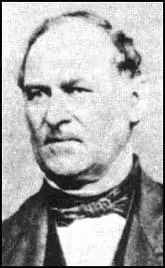Orville Browning

Orville Browning was born in Kentucky in 1806. After attending Augusta College he studied law and was admitted to the bar in 1831. That year he moved to Quincy, Illinois, where he worked as a lawyer.
Browning joined the Whig Party and was elected to the Illinois Senate in 1836. Eight years later he was elected to the House of Representatives but was defeated by Stephen A. Douglas in 1844. Attempts in 1850 and 1852 also ended in failure. Browning opposed the Kansas-Nebraska Act and in 1854 joined the Republican Party.
On the outbreak of the American Civil War Browning supported an aggressive policy towards the Confederacy. He clashed with Abraham Lincoln over his treatment of Major General John C. Fremont. On 30th August, 1861, Fremont, the commander of the Union Army in St. Louis, proclaimed that all slaves owned by Confederates in Missouri were free. Lincoln asked Fremont to modify his order and free only slaves owned by Missourians actively working for the South. When Fremont refused, he was sacked and replaced by the conservative General Henry Halleck. In a letter to the president Browning argued that Fremont's proclamation "does not deal with citizens at all but with public enemies."
Browning was keen to be appointed to the Supreme Court. This might explain Browning's increasing conservatism during the American Civil War. He became a government loyalist defending its policy of arbitrary arrests and he made a series of speeches attacking the Radical Republicans. Despite this new approach, Abraham Lincoln refused to nominate Browning. In the 1864 Browning refused to campaign for Lincoln but it not known how he voted.
In 1866 President Andrew Johnson appointed Browning as his Secretary of the Interior. He remained in office until Johnson lost power in 1869. Later that year Browning became a special attorney for the Chicago, Burlington and Quincy Railroad. Orville Browning died in 1881.
